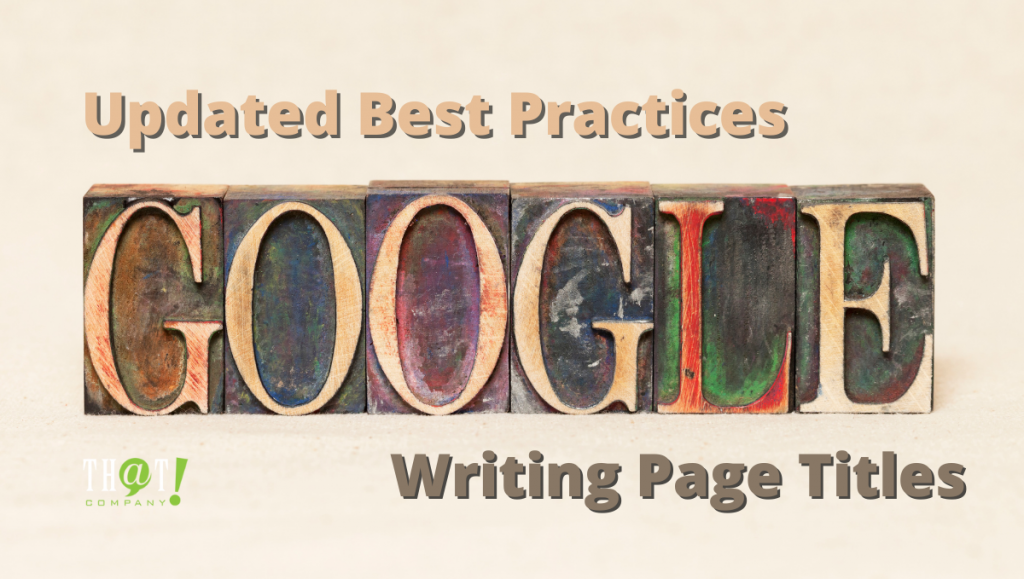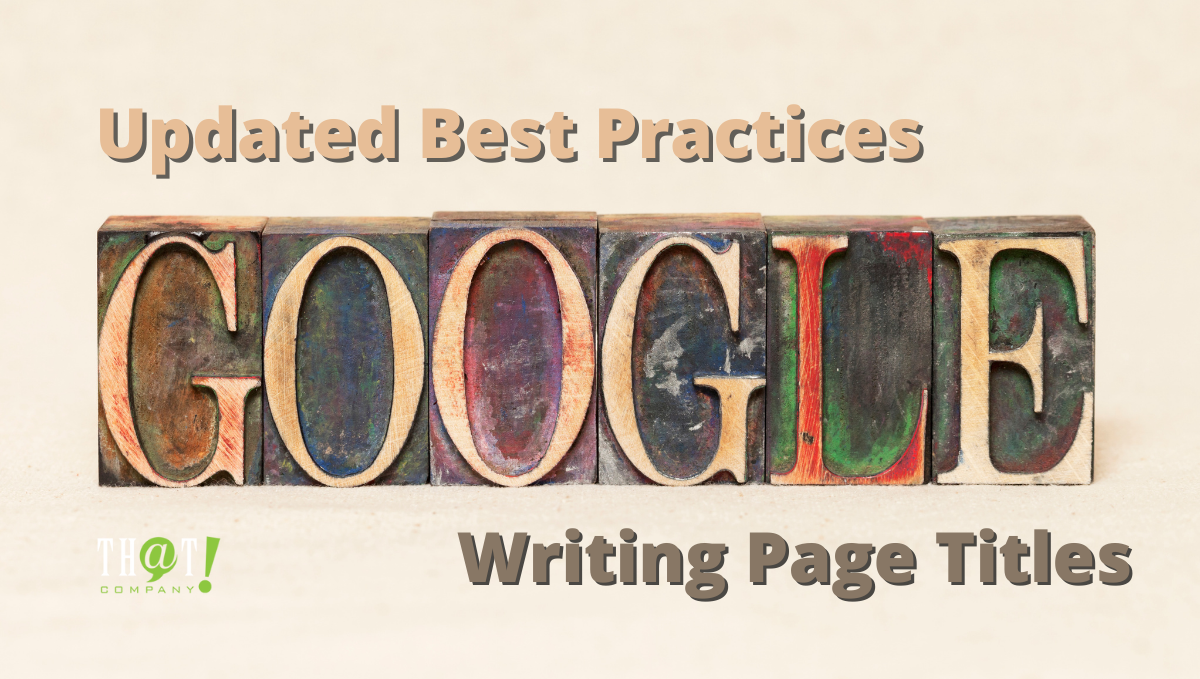What Website Owners Need to Know About Google’s Updated Best Practices for Writing an SEO Page Title
In August, Google confirmed their change on how page titles were generated in SERPs (Search Engine Result Pages). Google has now published an updated version of its guidelines for writing an SEO page title. These best practices shared from Google include valuable tips on preventing a website’s page titles from getting replaced or auto-generated by Google in SERPs due to their latest update.
Google’s reasoning behind this update was to make page titles more “readable and accessible” to a wider audience of searchers. They claimed that their update was to impact less than 20% of total page titles on their search engine. However, that could be an even lower percentage of website owners, white label web design gurus, and SEO experts begin utilizing their SEO Page Title best practices.
Google released this helpful information in a new document found in the “Advanced SEO” section of Google Search Central. Here they explain their advised best practices along with common issues that lead to page titles being replaced. Google is handing over some secret SEO-sauce on bite-sized bullet points for everyone to make the most of and perform better in SERPs. It’s not often that Google willingly hands over this information to SEOs, so we are rejoicing in this newfound comradery between the search engine giant and the internet marketing industry.
Now let’s dive into the updated Page Title best practices, referred to as “title links,” from Google.
What Are SEO Page Title Links?
Google is now referring to Page Titles as Title Links in their SERPs. A title link in the search result headline that’s clickable and takes searchers to the search result page. Previously, they have been referred to as Page Titles or meta titles by SEOs. It’s helpful that Google has determined a new terminology because a title link and a meta title can be different pieces of text even though they are both considered page titles. Here is an example of a title link:

Google has confirmed that they use several different sources to determine a title link for SERPs, but you can indicate your own title link for Google to display by following their guidelines and writing descriptive, keyword-driven text in a <title> element. Whether you write a meta title as your preferred title, Google may still choose an alternative. To avoid this, the text within the <title> element will be used for ranking purposes by search engines.
[bctt tweet=”It’s helpful that Google has determined a new terminology because a title link and a meta title can be different pieces of text even though they are both considered page titles.” username=”ThatCompanycom”]Best Practices Provided by Google for Writing Title Links (<title> Elements)
 So, by this point, you may be asking yourself, “What are best practices?“. Google, and most searchers, consider title links to be a critical element in a search result to give quick, informative insight into the content resulting from the search. As a website owner, you want to make sure your <title> element explains why it’s relevant to the searcher’s query. The title link is primarily the deciding factor searchers use when choosing which result to click on. Therefore it is essential to use high-quality, descriptive text in your title for your web pages.
So, by this point, you may be asking yourself, “What are best practices?“. Google, and most searchers, consider title links to be a critical element in a search result to give quick, informative insight into the content resulting from the search. As a website owner, you want to make sure your <title> element explains why it’s relevant to the searcher’s query. The title link is primarily the deciding factor searchers use when choosing which result to click on. Therefore it is essential to use high-quality, descriptive text in your title for your web pages.
Google’s High-Level Points for Title Link Text:
- Ensure every web page on your site has a clear title specified in the <title> element.
- Make your text in the <title> element descriptive and concise. Steer clear of vague descriptors, i.e., “Home” for the home page Also, be mindful of the length of your <title> elements, as those that are particularly verbose or long may end up truncated in search results and hinder your page’s ranking.
- Don’t keyword stuff. While keyword stuffing may have been all the rage years ago, it is more helpful to searchers now to have a few descriptive terms in the <title> element, not every single keyword that could fit the pages google clearly states that there is no benefit in using the exact words and phrases multiple times. For example, using a title text such as “Aloe, Aloe Vera, AloeVera, Vera Aloe” is not seen as helpful to a searcher and may make your results look spammy to search engines and searchers.
- Don’t repeat title text for every page or use boilerplate text in the <title> elements. Google weighs heavy importance on the fact that every web page has its own unique, descriptive title. Using a commonplace title for every page on a site makes it impossible for searchers to distinguish between two pages and makes it harder for Google to rank your page for search terms accurately. For example, using “Brand Name Items for Cheap” as the <title> element for every page on a commerce site doesn’t benefit the site and may decrease the likelihood of ranking individual pages. Boilerplate titles for every page are also bad for this same reason, i.e., “Brand Name – Cosmetics, Skincare, Haircare, Influencer Programs, and More,” as this is too broad and uninformative to searchers.
- Be conscious of Branding Your Titles. Using your Brand name in the <title> element on your site’s home page is reasonable and expected. However, displaying your Brand name in every <title> element on your website is repetitive if several pages of your website result in a query. If you are going to use your brand in every title, Google advises considering utilizing the brand name at the beginning or end of the title consistently and separate it from the rest of the text using a pipe, hyphen, or colon. For example:
<title>ExampleClothingSite: Browse Summer Skirts & Dresses.</title>
- Lastly, and like always, be very careful about disallowing search engines from crawling your pages. While you can prevent Google from crawling your site by using the robots.txt protocol on your site, it may not always prevent pages from being indexed. This means that Google bots can still wind up crawling your site if a different website links to yours. If Google does not have access to your site, they will often use off-page content to generate a title link for SERPs, such as anchor text from the linking site. To ensure you prevent a URL from being indexed, use the noindex directive provided by Google.
Common Issues With <title> Elements & How to Avoid Them
Not only did Google provide us with amazing insight on how to write descriptive <title> elements, but they also gave valuable insight into the common issues they see with <title> elements on web pages. Learn from the mistakes of others!
- Incomplete or half-empty <title> elements. e., including the site name but not the product name.
- Obsolete <title> elements. e., A page is used year after year and only updated slightly, but the <title> element was not updated to indicate the latest information.
- Inaccurate <title> elements. e., the title does not accurately indicate what the page is about, or the title is too broad.
- Micro-boiler plate text in <title> elements. I.e., using the same title for a series of books,”The Best Book Series Ever,” each book on their own page but not defining “Book 1”, “Book 2”, “Book 3,” and so on.
How Google Creates Title Links
Now, we hope this information has been helpful to you, and you run off and start updating your <title> elements appropriately. However, if you’re still not convinced or are thinking, “Google makes Title Links, why should I bother?” let’s dive into how Google generates title links and why your expert touch in writing them serves a better purpose for your site.
When Google needs to generate a title link for the Google SERPs, know that the process is completely automated. Google takes into account the content on the page it’s ranking as well as the references to that page on your website and across the internet. When creating a title link, their goal is to best represent and describe each result (as should it be your goal when creating your <title> elements – imitation is the sincerest form of flattery, right?).
Google Search tells us that they use these sources to determine title links automatically:
- Text in <title> elements. Clue one as to why you should write your own SEO Page Title.
- The main headline or visual title on a page.
- Heading elements such as <h1> and <h2> elements.
- Other text on the page is prominently displayed through the use of different style elements or calls outs.
- The general content on the page.
- Anchor text on the page, whether linking to other pages on your site or off-site links.
- Anchor text on other pages that point to the page they are writing a title link for.
What is an SEO Page Title?
 The SEO Page Title is the title of your web page or blog post. It includes necessary keywords that are most commonly found in search queries. A good title contains the most relevant keywords to describe your site or blog post.
The SEO Page Title is the title of your web page or blog post. It includes necessary keywords that are most commonly found in search queries. A good title contains the most relevant keywords to describe your site or blog post.
Using an SEO Page Title for a website has many advantages, but it is essential not to overdo it with keyword stuffing so as not to affect your search engine rankings which may lead other visitors away from your site and decrease web traffic.
When writing a page title, remember that it is the first thing that search engines use to determine the relevancy of your website and content. It’s also the first piece of information people will see when they’re browsing through search engine results. If you put effort into creating a good title for your site, it may increase overall traffic and encourage return visitors.
How to Create an SEO Page Title?
Use keywords relevant to your business to help people find what they’re looking for by using keywords relevant to your business to help them find what they’re looking for. Most importantly, follow Google’s Guidelines above. You want visitors who are interested in purchasing or learning about your product or service.
Title Links in a Nutshell
First, we want to thank Google for offering a new terminology for us called Title Links and making their usage on our sites different from <h1>s and meta titles. With Google announcing its best practices for creating <title> elements, we highly encourage website owners and fellow SEOs to utilize this rare insight of knowledge. If you want help boosting your sites Google’s ranking, learn more about our white label SEO services. That Company wishes you luck in <title> element endeavors, and may the rankings ever be in your favor.































